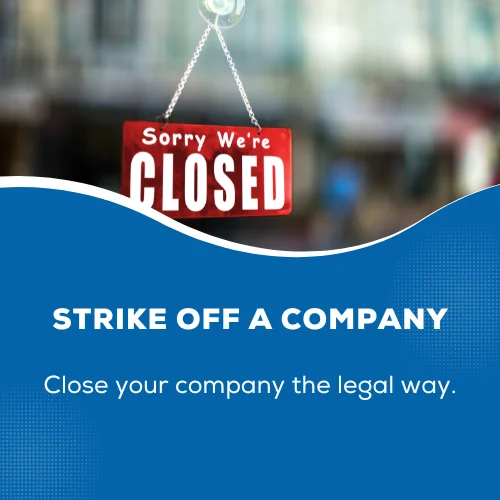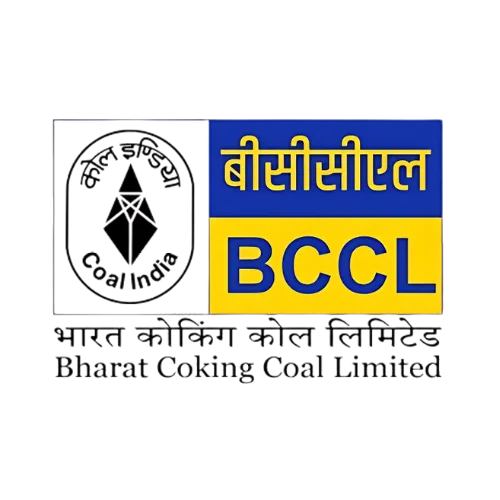Strike Off a Company
Simplified Company Closure with Expert Assistance!
Close Your Inactive Company Legally & Hassle-Free!

Need to Close Your Company? Apply for Strike Off Now!
- Get Instant Quote
What’s Included ✅
- Consultation on Eligibility & Procedure
- Preparation of Strike Off Application (Form STK-2)
- Drafting of Board Resolution & Affidavits
- Assistance in Clearing Pending Compliance (if any)
- Filing with MCA & Tracking of Status
- Final Strike Off Approval & Certificate from MCA

Exclusive Free Benefits 🎁
- Pre-Check on Company’s Strike Off Eligibility
- Consultation on Pending Compliance / Liabilities
- Draft Templates (Affidavit & Resolution)
- Consultation Call on Tax Closure
10,000+ Companies & Individuals Put Their Trust In Us
























✅ Clear Guidance: They explained every step in simple, easy-to-understand terms, so I always knew what was happening.
✅ Fast & Efficient: My filing was completed quickly without any unnecessary delays.
✅ Accuracy & Trust: I felt confident knowing my details were handled with care and precision.
✅ Great Support: Any small questions I had were answered patiently and thoroughly.
Strike Off of a Company
The process of striking off a company is a crucial aspect of business Strike Off. It will make sure that the company has been removed legally from the official register of companies.
Businesses can officially end their existence without going through liquidation with the help of procedure of strike-off, whether due to inactivity, voluntary dissolution, or regulatory non-compliance.

What is the Strike-Off of a Company?
Company strike-off is the process of removing the name of the company legally from the official register that has been maintained by the regulatory authority like ROC i.e. Registrar of Companies in India. Once struck off, the company ceases to exist as a legal entity, and all its obligations as well as liabilities will be dissolved.
You can simply apply to the ROC i.e. Registrar of Companies in order to strike off its name from ROCs (*subject to certain terms & conditions).
Types of Strike Off of Company in India
There are two primary methods are available for the Strike Off of a company which are as given below:
Voluntary Strike Off
This method has been initiated by the owner of the company in India. It will be due to numerous reasons including completion of the project, financial problems, business becoming inoperative, rapid decrease in customers & revenue and many more.
Compulsory Strike Off
Sometimes the striking off of the company has been directed by the regulatory authorities, court orders, or creditors due to non-compliance, non-payment of debts or any other legal reasons.
Reasons of Company Strike Off in India
Financial Problems
The most common reason for striking off of a company can be financial difficulties. The owner of the company will be forced to close their company if it is not able to generate enough profit in order to cover its cost.
Strategic Decision
Sometimes the owner of the company may decide to make major changes in the strategy of their business or to move on to the new venture, in such cases they need to strike off their current company.
Non-Compliance with Regulatory Requirements
When a company is not able to comply with all the regulatory requirements, it will lead to the compulsory strike off of that particular company.
Mergers or Taken Over
If your company has been taken over by another company or another company overlaps the products or services of your company, then striking off your company becomes mandatory.
Business is inoperative
One of the major reasons is that if your company in India is inoperative now, then your company will need to strike off.
Lost Customers & Revenue
Sometimes a company loses its customers or revenue due to a rapid decrease in the demand of products or services of the company. In such cases, the owner of the company may decide to strike off the company.
Financial Problems
Strategic Decision
Non-Compliance with Regulatory Requirements
Mergers or Taken Over
Business is inoperative
Lost Customers & Revenue
Advantages of Company Strike Off in India
Simple & Cost-Effective
As compared to the liquidation, the process of strike off is quicker as well as less expensive.
No Legal Liabilities
After the striking off of the company, it cannot be sued for the business activities.
No Further Compliance Burden
After striking off of the company, it will be free from all the statutory obligations.
Relief for Directors & Owners
It will be a great relief for directors as well as shareholders and they can focus on new business opportunities.
Disadvantages of Company Strike Off in India
Can be Reversed if Debt Exists
The strike off of the company can be cancelled in case any liabilities will be discovered after completion of the process.
Limited Creditor Protection
After the strike off, creditors may not be able to claim their debts.
Legal Consequences for Non-Compliance
Directors may face penalties in case a company is forcibly struck off.
Assets Get Frozen
If any assets of the company were not transferred before strike-off, it may become government property.
Process of Voluntary Striking Off of the Company
After that, you need to prepare all the essential documents that have been required for striking off the company in India. the requisite documents include:
- Affidavit which confirms that there are no liabilities on the company and all the dues are cleared.
- The other important document is a statement of accounts that reflect the financial position of the company & must be certified by a Chartered Accountant.
- A certified copy of a special resolution passed by the directors of the company for the striking off of the company.
Process of Compulsory Strike Off of the Company
Essential Documents Required for Strike Off of Company
- Board Resolution Approving the Strike-Off
- Consent from Shareholders (if required)
- Latest Financial Statements
- Statement of No Pending Liabilities
- Indemnity Bond (in some jurisdictions)
- Application Form prescribed by the Regulatory Authority

Post Strike-Off Considerations

Restoration of the Company
In some specific cases, a company can be restored to the register, if required.

Impact on Business Owners
Owners cannot use the name of the company or conduct business under it.

Outstanding Liabilities
If any liabilities remain, directors may be held personally liable.
Common Challenges in NGO Darpan Registration in India
The major consequences of Company Strike Off in India:
- The remaining assets will be transferred to the crown or government.
- The name of the company will become available for re-registration by another entity.
- The company will cease to exist and cannot conduct any business.
- Directors & Shareholders will lose their over the assets of the company.
- Any legal claims or liabilities against the company may not be enforceable, once it is struck off.
How to Avoid Compulsory Strike Off of a Company?
In order to prevent the company from compulsory strike off, just make sure about some crucial things which are:
- File annual returns as well as financial statements on time.
- Maintain proper statutory records and filings.
- Keep tax payments up to date.
- Respond to regulatory notices quickly on time.
How Can We Help With Striking Off Company?
Our dedicated team of experts will offer you the professional assistance in the following ways:
- Preparing and Filing Necessary Documents
- Handling communications with regulatory authorities
- Advising on alternative business closure options if needed
- Evaluating eligibility for voluntary strike off
- Making sure about compliance with statutory requirements
- Assisting in settling liabilities before strike off
Why Choose Click To Professionals?
- Hassle-Free Process
We will handle all legal and procedural aspects, making sure about a smooth closure.
- Compliance Assurance
We will make sure that all legal obligations have been met before striking off.
- Experienced Professionals
Our dedicated team has in-depth knowledge of company law and regulatory requirements.
- Affordable Pricing
We will provide cost-effective solutions as per your needs.

Strike of a Company
It’s important to officially close a business after it stops working or has served its function. In India, the best way to do this is to strike off a corporation with the ROC. It can be easier, cheaper, and more legally sound to understand the process of closing a business, whether the company does it on its own or the government does it. This is especially true if you get help from specialists.
Knowing what ROC Strike Off means for a business
The word ROC The Registrar of Companies (RoC) takes a company’s name off official records when it is struck off. This could happen on its own or because ROC told it to. The legal end of a company’s existence happens when it is struck off. The strike-off fee and the strike-off business process are both important steps along the way.
What is a company that strikes off?
When a company is taken off the corporate registry, it is no longer legally a business. This is called a strike off. A firm can be struck off for the following reasons:
It never did business within a year of becoming a company.
It didn’t perform any business for two years and didn’t ask to be considered dormant.
Subscribers didn’t pay their subscription fees or complete the mandatory statement.
These are common reasons for the ROC to strike off a firm.
Who Can Start the Process of Strike Off of a Company?
Voluntary Closure: Strike Off a Private Limited Company
A director can choose to voluntarily strike off a company. This is usually done with a private limited company that is no longer needed or is inactive. It’s a cheaper option than going out of business.
Strike Off Started by ROC
If the qualifying requirements are met, the registrar can also start the strike off process on its own. This is part of the ROC’s process for taking a company off the list of active companies. It is used to clean up the registry of inactive, shell, or defunct companies.
How to Step-by-Step Strike Off a Company
1. Grounds and Getting Ready
Companies can be struck off for either voluntary or ROC-initiated reasons, such as not doing anything, not having any business, or not following the law. The strike-off process can commence once these are found.
2. What the Company Must Do to Voluntarily Strike Off
To strike off a corporation, there must be a board meeting and an EGM resolution that 75% of the paid-up capital agrees to.
File the company strike off fee, which is usually called the company strike off fee or the fee for striking off a company. It can be anywhere from ₹5,000 to ₹10,000, depending on the rules for filing.
Fill out and send in Form STK-2 with the following documents: an indemnity bond (STK-3), an affidavit (STK-4), a statement of assets and liabilities (STK-8 within 30 days), and a resolution.
Put a public notice in STK-6 on the MCA website, in the official gazette, and in English and vernacular newspapers.
This finishes the official process for a corporation to voluntarily close down.
3. The ROC started the process of strike off
The ROC sends a notification (STK-1) to the corporation and its directors.
The business has 30 days to reply.
If ROC doesn’t get a satisfactory answer, they will go ahead and strike off the firm.
The ROC posts notices on the MCA website, in the gazette, and in newspapers as part of the process of striking off a firm.
Why getting help from an expert makes the strike off process easier
Legal paperwork, resolutions, fee payments, and publications are all part of the process of completing the strike off of a firm. You can get advice from an expert, like a Chartered Accountant or a Company Secretary, with:
Making sure the strike-off process is done right
Figuring out and paying the right firm strike-off price
Making and sending in documentation and disclosures that are right for the CRO
Efficiently managing the procedure of striking off a firm to avoid delays or rejection
This makes it considerably easier and safer for ROC to strike off a corporation.
Typical Company Strike Off Fee and Other Costs
The charge for striking off a company, also known as the company strike off fee, is usually between ₹5,000 and ₹10,000, depending on the most recent rules.
Manupatra Academy Csdivesh Goyal Next Companies
Depending on how complicated the job is, experts may charge professional fees.
Extra charges for putting notices in newspapers
These add up to the entire cost of the strike off process.
Legal Effects of Striking Off a Company That Are Important
Important Legal Effects of Striking Off a Company
Legal Closure
After a business is struck off, it no longer exists legally, and its certificate of formation is no longer valid.
Unpaid debts
Liabilities, obligations, and assets do not go away. Even after Manupatra Academy and Csdivesh Goyal were struck off, directors and stockholders may still be responsible.
Restoration and Appeals
If the company is struck off, either voluntarily or by ROC, it can be restored by NCLT within three years if the right steps weren’t followed or the reasons were invalid.
Conclusion
Choosing to ROC strike off a company, either on your own or through a ROC effort, is a simple and cheap way to legally dissolve a business that isn’t operational. Filing the right documents, paying a strike off charge, dealing with debts, and issuing notices are all part of the strike off firm procedure. Expert aid makes the process clearer and makes sure that everyone follows the rules.
If you’re thinking about strike off private limited business or just want to know more about the strike off price, the process, or how to strike off a company, it’s a good idea to talk to a specialist. With expert help, a simplified closure gives you peace of mind and a valid legal closure.
Contact Us:
Call us at +91 84480 94507 or email us at info@clicktoprofessionals.com for any queries.
Choose Click To Professional – Your Partner in Business Success.










